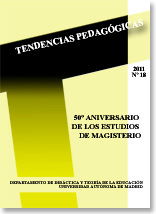La aportación del proyecto de comunidades de aprendizaje a la transformación social y educativa de un barrio. La experiencia de La Estrella-La Milagrosa en Albacete.
Palabras clave:
Transformación socioeducativa, modelo comunitario, procesos dialógicos, trabajo en red, Comunidades de aprendizaje, Inclu-ed, Urbanitas.Derechos de autor 2015 Tendencias Pedagógicas

Esta obra está bajo una licencia internacional Creative Commons Atribución-NoComercial 4.0.
Resumen
En este artículo se presentan las aportaciones que el proyecto de Comunidades de aprendizaje está realizando a la transformación social y educativa de los barrios La Estrella y La Milagrosa. Se explica el importante papel que han tenido los centros educativos de estos barrios y como el modelo comunitario, que se está implantando en las actuaciones sociales y educativas, se ha visto enriquecido por las aportaciones de los programas Inclu-ed y Urbanitas. También se describe como este proceso ha conducido a la construcción de un Proyecto Educativo de los Barrios La Estrella y La Milagrosa que está permitiendo realizar un trabajo comunitario y dialógico entre el profesorado de los centros, familiares, entidades e instituciones de Albacete.
Descargas
Citas
Apple, M.W. (1986). Ideología y currículo. Madrid: Akal
Aubert y otros (2006). Dialogar y transformar. Pedagogía crítica del siglo XXI. Barcelona: Graó
Aubert y otros (2009). Aprendizaje dialógico en la Sociedad de la Información. Barcelona: Hipatia
Baudelot, C. y Establet, R. (1976). La educación capitalista en Francia. Madrid: Siglo XXI
Bernstein, B. (1993). Clases, códigos y control. La estructura del discurso pedagógico. Madrid: Morata
Bourdieu, P. y Passeron, J.C. (1977). La reproducción. Elementos para una teoría del sistema de enseñanza. Barcelona: Laia
Bowles, S. y Gintis, H. (1985). La instrucción escolar en la América capitalista. Madrid: Siglo XXI
Castells, M. (1997). La era de la información. Economía, sociedad y cultura. Vol. I: La sociedad red. Vol. II: El poder de la identidad. Vol. III: Fin del milenio. Madrid: Alianza Editorial, 1996-97
De la Calzada, A. y Villar, C. (2011). La autonomía como estrategia de éxito: tres centros educativos trabajan en red en dos barrios. Revista Escuela, n. 2 febrero, pp. 20-22
Elboj y otros (2006). Comunidades de aprendizaje. Transformar la educación. Barcelona: Graó
Flecha, R. (1997). Compartiendo palabras. Barcelona: Paidós
Flecha, R. y Puigvert, L. (2002). Las comunidades de aprendizaje: una apuesta por la igualdad educativa. REXE Revista de estudios y experiencias en educación. Concepción, Chile: Facultad de Educación de la Universidad Católica de la Santísima Concepción, n. 1, v.1, pp. 11-20
Freire, P. (1997). A la sombra de este árbol. Barcelona: El Roure
García, J. (2010). El contrato de inclusión dialógica como instrumento para la transformación del colegio La Paz (Albacete). Aula de innovación educativa, n. 188, pp. 42-46
García, R. y otros (2011). Gestión de la participación para la transformación y el éxito en el colegio La Paz. Organización y Gestión Educativa, nº 3 junio 2011, p. 32-34
Giroux, H. (1990). Los profesores como intelectuales. Barcelona: Paidós
Habermas, J. (1987). Teoría de la acción comunicativa. Vol. I: Racionalidad de la acción y racionalización social. Vol. II: Crítica de la razón funcionalista. Madrid: Taurus
Vygotsky, L.S. (1995). Pensamiento y lenguaje. Barcelona: Paidós
